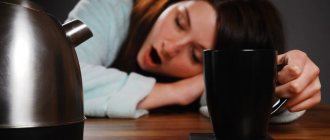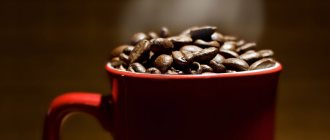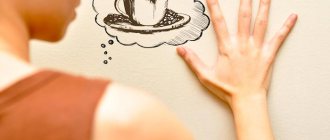The reason why coffee has laxative and diuretic effects
Many coffee lovers notice a certain dependence. After a fragrant cup of coffee, they almost immediately feel that they need to visit the toilet, including not only for minor needs. Why is this happening? Science will answer this.
Yes, indeed, coffee affects some people as a diuretic (most people), but for other lovers of a tonic aromatic drink, the tart fragrance of which cannot be confused with anything else, coffee acts as a laxative. Moreover, from some types of drink the effect can be so strong that a person can think about food poisoning. As they say, to get to where you need to go! However, in reality there is nothing criminal about this. Only physiology and chemistry.
Indeed, it (coffee) can stimulate intestinal peristalsis (wave-like contraction of the walls of hollow tubular organs (esophagus, stomach, intestines, etc.), promoting the movement of their contents), which is why sudden urges may occur. But which effect we will feel more depends on our body and the way the body perceives the substances included in the drink. However, there are also people for whom this drink has no effect. But there really aren't that many of them.
Conclusion - why does coffee make you want to go to the toilet?
Individual reactions to coffee can be completely different. For example, someone feels a laxative or diuretic effect ten minutes after taking a portion of the drink, while others do not feel it at all. This also fits into the concept of the norm: according to recent research, genes are responsible for our personal perception of coffee.
- The body's reaction to coffee is normal.
- Chemicals in coffee activate various body systems causing a diuretic or laxative effect.
- The reaction to coffee is individual for each person.
Why does coffee have this effect?
Doctors from the English hospital Royal Hallamshire Hospital decided to answer this question. To this end, researchers S. Brown, P. Kann and N. Reed conducted a survey of volunteers of both sexes.
The data they collected shows that people do have different experiences with coffee and its impact on bathroom urges. However, a common “symptom” was reported by a total of 29 percent of those surveyed. Moreover, 63 percent of respondents were women.
By studying data from volunteers, the researchers also determined that this feeling occurs in people regardless of whether they drink natural or instant coffee, whether it is “normal” coffee or decaffeinated coffee, which immediately helped to dismiss the influence of the drink’s most famous chemical compound, confirming that this alkaloid cannot affect the functioning of the walls of the body cavities - the intestines.
What type of coffee has a fixing effect?
Due to the presence of an increased concentration of caffeine in the composition, stool consolidation may occur when drinking a drink based on robusta beans. Also, hardening of stool is observed from sweet espresso, which provokes spasm of the intestinal tract and difficulty in emptying it.
Acorn coffee also strengthens. This effect is noted due to the presence of the following substances in its composition:
- starch. It is easily absorbed and has a fixing effect;
- tannins. Prevent the development of diarrhea and other disorders in the gastrointestinal tract;
- Quercetin. Helps relieve spasms and relieve pain.
In addition, acorn drink is rich in carbohydrates and proteins necessary for the body. This is a natural antibiotic that can perfectly fight diarrhea and eliminate lesions localized on the mucous membranes of the intestinal tract. True, the use of this remedy in the presence of subsequent symptoms will not give the desired result:
- hyperthermia;
- gagging;
- dizziness;
- the presence of blood and mucus in the stool;
- dyspnea.
In this case, medical help is needed.
What component of coffee affects and gives this effect (laxative and diuretic)?
Ultimately, the researchers concluded that drinking coffee stimulates the production of the hormone gastrin. It, in turn, stimulates the stomach to produce more gastric juice and increases the motility of the colon. This, in turn, can - for some more, for others to a lesser extent - stimulate intestinal motility and, as a result, make you feel the need to defecate.
Moreover, from the experience of various coffee lovers, it can be noted that different varieties and types of coffee can act in different ways from the point of view of the laxative effect - some more intensely, others practically not at all.
Can it be used for diarrhea?
The coffee drink has a beneficial effect on the body, saturates it with amino acids, and accelerates metabolic processes. True, such characteristics are noted only in the absence of health problems. If you have diarrhea, espresso will only make the situation worse. This is justified by irritation of the mucous membranes of the intestinal tract.
Doctors strongly advise against drinking coffee if you have diarrhea. In addition to aggravating its course, the following bad changes are likely:
- increase in blood pressure characteristics;
- swelling;
- migraine.
The laxative effect of coffee becomes even stronger if you add milk to it.
Dairy particles that have not been fully processed have a negative impact on the intestinal tract. The processes of decay and fermentation begin in the body. Accordingly, the drink does not help in solving difficulties, but creates new ones.
Diuretic caffeine
But what about those who, after drinking coffee, feel that they need to quickly go to the toilet for a minor need?
This question relates to the topic of caffeine content in the drink. This particular alkaloid is a stimulant that usually increases urine production. This alkaloid blocks the production of antidiuretic hormones, stimulates blood flow and activates the adrenal glands. The amount of urine increases, and you want to run more often at “00”, which, in turn, can lead to mild dehydration and subsequent constipation. see also
19 Simmering Facts About Tea: Twig Tea Is More Invigorating Than Coffee And Who Is Earl Gray
By the way, research conducted in 2002 shows that those who drink coffee regularly have a greater tolerance for the urge to urinate, so they don't have to. go to the toilet frequently, even after they have drunk 2-3 cups per day.
Strengthens or weakens the coffee drink
A number of studies have shown that coffee weakens. True, this effect is observed only in eighty percent of people. This is primarily due to the individual characteristics of the body. In addition, the quality of the product is of no small importance.
It is noted that coffee beans contain natural caffeine and a host of other substances. The instant product contains a synthetic alkaloid. In addition, there are many chemicals present. Therefore, instant coffee affects the digestive system somewhat differently. When using it, the reaction is unpredictable. Both diarrhea and constipation are possible.
Coffee: a diuretic or a laxative?
Despite this, coffee is not a laxative. It may help with mild constipation, but only for 30% of people. However, as we said earlier, by removing fluid from the body, coffee can only do harm.
As for the diuretic, if you drink coffee rarely, you can try using it on an occasional basis, it will help. But if you drink coffee often, the effect of caffeine will gradually disappear.
And don’t forget that self-medication without medical help can be dangerous to health or even life!
But you need to remember the effects of the odorous drink. Especially for those who like to drink a cup of tart before work. Especially on an empty stomach. When your stomach gets sick on the road and you need a restroom that isn’t nearby, what an “adventure” it will be!
Should you worry if coffee makes you want to go to the toilet?
Researchers claim that not everyone experiences the laxative effect of coffee, approximately 25-30% of people. The diuretic effect occurs much more often, and all coffee consumers experience it to one degree or another.
Does this mean that there is something wrong with the body?
You can rest assured. If after coffee you want to go to the toilet, then the body’s regulatory system is working normally, without failures or disturbances.
To avoid awkward situations in everyday life, doctors give the following recommendations.
- In the morning, drink coffee no later than an hour before leaving the house, especially if you have a long commute.
- Drink the drink no later than 30-40 minutes before leaving places equipped with sanitary facilities.
- The larger the serving of coffee, the greater the diuretic effect it can have.
- During a business meeting or negotiation, you should drink coffee with caution, especially if you know that the drink has a laxative effect for you. It is better to limit fluid intake before long and important communication.
Why is it good to drink water after coffee and which one is better? Rules and methods of drinking coffee drinks
Today we will find out why drinking cold water after coffee is beneficial.
, as well as what rules and methods of drinking certain types of coffee drinks exist
WHY IS IT USEFUL TO DRINK WATER AFTER COFFEE AND WHICH IS BETTER. RULES AND METHODS OF CONSUMPTION OF COFFEE DRINKS
Good afternoon, in today’s article we will tell you why drinking
cold
water
after coffee
is good , what are
the rules for drinking coffee
, and
how
drinking
liquid
with different
types of coffee drinks
the human
body .
As a rule, when visitors find themselves in a bar
or
a coffee shop
, then initially they are perplexed
why
they brought
additional glass
of cold water
to their ordered
espresso coffee .
It is worth noting that most true coffee connoisseurs
around the world are quite
meticulous
about the process
of preparing
one or another
type of coffee
, from
grinding the beans
in
a coffee grinder
to
fine-tuning the coffee machine
with direct
tasting
of the freshly brewed drink.
Such coffee lovers
always
appreciate of
professional
baristas
with
serving
cold
water
along with
coffee
.
few
coffee drink
lovers
know that real bean coffee
must
be washed down with water .
WHAT IS RISTRETTO COFFEE. FEATURES AND HOW TO COOK
Who came up with the tradition of drinking coffee with cold water and what is it for?
It has long been believed that ready-made
coffee
with
water
in
Ancient Greece
before our era.
Adherents of this version
suggest that such an unusual
combination
of two
different components
is
the reason for
the hot climate of Greece and the opportunity to quickly cool down after
a hot
coffee drink.
WHAT EFFECT DOES COFFEE HAVE ON THE HUMAN BODY?
In addition, it is believed that in Turkey
There is
a similar
custom of serving
a glass of water
immediately
with
coffee
rather
than after
it .
By the way, such a ritual
was
successfully
introduced
into Europe
a little later, around
the Middle Ages .
As for Europe
, thanks to
the Austrians
, the habit of
washing down
various coffee drinks
with water
to
be “
reinvented
” and this tradition was called “
Viennese coffee
”.
1. WAYS OF CONSUMPTION OF COFFEE DRINKS. WHY SHOULD YOU DRINK WATER AFTER COFFEE?
In each individual country, coffee
They drink
differently
with
water .
It is worth saying that
black
and usually
strong espresso coffee
is usually washed down with water .
In southern and European countries, these types of coffee
are washed down not only with
water
of different
properties , but the consumption of liquids is also
alternated
in different ways .
For example, residents of Europe alternate sips of coffee
with water
,
and people living in southern countries, on the contrary,
start
drinking water
only
after drinking
an invigorating drink.
It is worth noting that each of the methods of drinking coffee
with
water
gives the coffee connoisseur a different
effect
.
If you drink the coffee drink alternately
,
alternating
with
cold water
,
the taste buds
on the tongue are
more effectively
and each
new sip of coffee
will be
rich
,
bright
and
slightly tart
.
WHAT IS ESPRESSO COFFEE? HOW TO PREPARE A DRINK CORRECTLY
Is it necessary to do this?
The need to drink water is due to important reasons. The main ones are eliminating possible harm and obtaining as much benefit as possible.
And also for:
- maintaining acid-base balance;
- reducing the risk of dehydration, which manifests itself under the influence of caffeine and theobromine on kidney activity;
- preventing surges in blood pressure (water neutralizes the effect of caffeine, which prevents heart rhythm disturbances);
- preventing darkening of tooth enamel (the pigment contained in coffee is removed as water is consumed);
- eliminate heartburn that occurs due to increased acidity in the stomach after drinking.
In addition to the above aspects, a glass of water after coffee, in addition to prolonging the aromatic aftertaste, mitigates the negative impact of alkaloids (caffeine and theobromine) present in coffee beans on the body.
To avoid possible harm from the coffee product, be sure to combine it with water.
Could there be constipation?
Sometimes people experience constipation from drinking coffee. Such changes are due to the diuretic properties of the drink. At the same time, fluid is removed from the body and the stool in the colon begins to harden. Therefore, coffee lovers are advised to drink sufficiently large amounts of liquid throughout the day.
Stool consolidation is most often observed in those who abuse coffee drinks and exceed the permissible dosage.
In this case, the intestines are greatly depleted and are unable to digest food. This leads to constipation.
Is it possible to drink coffee if you are constipated?
According to doctors, drinking coffee for constipation is not only possible, but also necessary. True, in moderation. Thanks to this, intestinal activity is stimulated and the process of excretion of feces is simplified.
If the fixing effect is caused specifically by coffee drinks, it is better to temporarily abandon them or start drinking coffee with milk.
Is coffee from a coffee shop bad or homemade?
Those who buy a regular glass of coffee from their favorite coffee shop are much less likely to suffer from poor health after drinking coffee. It uses a coffee machine and a standard recipe, meaning the caffeine content in your favorite latte will almost always be the same. At risk are lovers of natural coffee who prepare the drink themselves, in a Turkish coffee, and usually calculate the dosage only approximately.
- First, it could be a new variety that has more caffeine, or a blend with a higher Arabica content. The point is that in the usual dose, for example, a spoon per cup, you will get more caffeine, but the body is not used to this.
- Secondly, it is difficult to calculate the number of grams - they use different spoons at home, and the slide can be larger or smaller. And if you grind the beans before cooking, it is even more difficult to calculate the amount, and it turns out that there is more ground coffee in a Turk.
- Thirdly, a lot depends on how the drink was prepared. If it was simmered over low heat, and then stood in a pot for a while along with the grounds, the concentration of caffeine in it will be much higher than if you cook it relatively quickly and pour it through a filter or strain the grounds.
Even slightly exceeding the usual dosage of caffeine can cause a person to feel unwell. However, this feeling usually passes fairly quickly.
Bad from instant coffee
Instant coffee more often than natural coffee causes stomach pain, weakness, nausea, and sometimes you may feel cold sweat. And in this case, it’s not just about caffeine, although there is usually more of it, but also about all the chemical additives. The share of natural grain in soluble powder or granules is 15-20%, everything else is dyes, stabilizers, preservatives, volume powders, etc. The body reacts to such a “chemical attack” much stronger.











